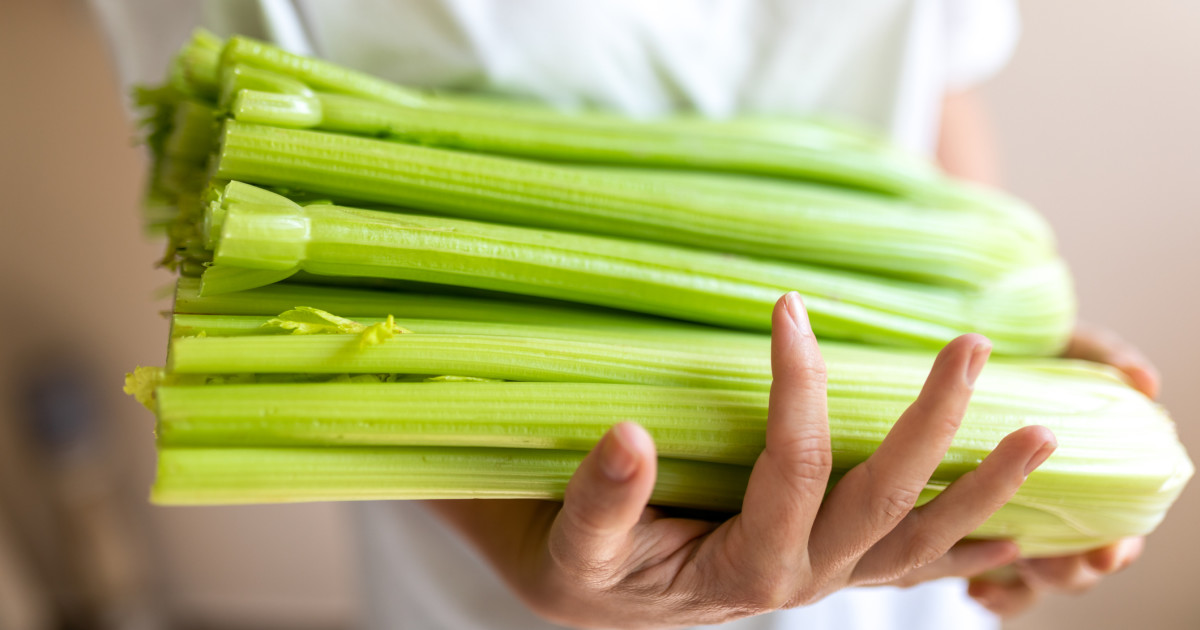
Registered dietitians and other health experts usually suggest “eating the rainbow”—or consuming a rich variety of colorful foods. For some, celery makes eating green easy. It’s a cinch to slice it, dice it and throw it into soups and salads, or consume it as a snack with dips like peanut butter and ranch dressing.
What happens if you eat celery every day, though? Is that even a good idea? Broadly speaking, registered dietitians share that it’s vital to understand how the foods we eat daily (or consistently) affect our overall health, whether that’s celery, bananas, salty snacks or sweets.
“Our bodies are like little chemistry labs, constantly reacting to what we put in them,” explains Andrea Soares, MS, RDN, CSSD, a registered dietitian with Top Nutrition Coaching. “When we eat something regularly, it becomes part of our internal environment. So, understanding how a food like celery influences things like hydration, digestion and inflammation helps us make smart choices and avoid overdoing it.”
She says nutrition is at its best when it’s all about variety and balance. Here’s how eating celery every day can play into that and support your overall health.
🩺SIGN UP for Parade’s health newsletter with expert-approved tips, healthy eats, exercises, news & more to help you stay healthy & feel your best self💊
Celery Nutrition Facts
Celery is nutrient-dense. “Celery contains essential nutrients, such as vitamin K, vitamin C, potassium and folate, which all contribute to bone health, immune strength and cardiovascular health,” points out Lena Bakovic, MS, RDN, CNSC, a registered dietitian at VNutrition.
Plus, according to the USDA, one medium celery stalk weighing 40 grams contains:
Calories: 6
Total fat: 0 grams
Cholesterol: 0 milligrams
Dietary fiber: 1 gram
Total sugars: 1 gram
Added sugars: 0 grams
Protein: 0 grams
Calcium: 1 milligram
Potassium: 2 milligrams
Sodium: 32 milligrams
Iron: 0 milligrams
You might be surprised to see that celery contains six calories. Doesn’t celery actually have negative calories? Registered dietitians stress that the “negative calorie” idea—often promoted by diet culture—is a misnomer.
“The claim is that some foods, like celery, burn more calories to chew and digest than they actually provide—but that’s not true,” reports Michele D. Rager, DCN, RDN-AP, LDN, FAND, the head of clinical nutrition at Berry Street. “While it’s true that digestion expends some energy—this is called the thermic effect of food—it’s not more than the calories the food contains.”
Rager suggests throwing out the negative calorie goal. “Rather than chasing ‘negative calories,’ focus instead on choosing foods that add nutrition, balance and satisfaction to your plate,” she advises.
Related: Over 50? This Common Dinner Food May Be Slowing Your Metabolism
Is It Good To Eat Celery Every Day? 10 Benefits
Eating celery daily—or consistently—will help you get more fiber, vitamin K and other nutrients that are essential for fueling digestive health, weight-related goals, bone health and even support your brain. Registered dietitians shared the benefits of regular celery consumption.
1. You’ll stay hydrated
Plain water is one of the best ways to meet your hydration needs, but it’s far from the only way. The CDC has long pointed out that water-rich foods can also contribute to warding off dehydration. Soares puts celery in that category.
“Celery is about 95% water, so it’s a sneaky way to boost hydration—especially helpful if you forget to drink enough water during the day,” she says. “Staying hydrated supports everything from skin to joint health.”
2. You’ll give your brain a boost
Emerging research, including a 2025 review, suggests celery is quite a smart choice for people looking to support their brain health.
“Luteolin and other compounds may help protect your brain and nervous system cells from damage,” explains Amanda Sauceda, MS, RD, a registered dietitian. “This may be due to the fact that these compounds have an anti-inflammatory effect, but studies have mostly been done with animals, so we can’t say for sure.”
3. Your digestive system will thank you
Celery has multiple key elements that make it a winning recipe for your gut health. “Thanks to its fiber content, celery supports regular digestion and a healthy gut microbiome,” Rager explains. “The combination of adequate water and fiber intake can decrease the risk of constipation and promote smoother digestion.”
You’ll also inch closer to meeting your daily fiber needs, which most Americans don’t.
4. You might naturally fight inflammation
Soares notes that celery boasts anti-inflammatory compounds like apigenin and luteolin. “That can be especially helpful if you deal with chronic inflammation, which is linked to everything from heart disease to arthritis.”
Research published in 2023 even suggested that luteolin might assist people with pain from chronic conditions by reducing inflammation.
5. You could see better bone health
Make no bones about it—celery contains vitamin K, and that could bolster your bones. “Vitamin K [is] a nutrient that plays an important role in bone metabolism and helps your body use calcium effectively,” Rager explains. “Consistently eating vitamin K–rich foods like celery may support stronger bones and reduce your risk of fractures over time.”
Related: The Fruit Cardiologists Say You Should Eat Every Day for a More Resilient Heart
6. You’ll support blood clotting
We’re going to stick with vitamin K benefits for a second because, as Sauceda insists, “Vitamin K doesn’t get talked about as much as it should.”.
In addition to bone health, she reports that vitamin K also helps with blood clotting. Effective blood clotting is vital in helping your body heal more quickly from things like small cuts (perhaps from cutting celery). She says a large stalk of celery (11 to 12 inches or 64 grams) contains about 15% of your vitamin K needs.
7. You might lower your cancer risk
Luteolin is also at the root of this potential benefit of eating celery consistently. Sauceda points to research indicating that this compound might have anti-cancer effects.
“Celery is a source of luteolin, which is a compound that may have anti-cancer effects. Luteolin may encourage apoptosis, or cell death, of cancer cells like lung and colorectal cancer.”
8. You could notice blood pressure improvements
Soares reveals that celery is rich in another compound, known as phthalide, which may support the prevention or control of hypertension. “Phthalide…may help relax blood vessel walls and improve blood flow,” Soares shares. “Plus, it’s naturally low in sodium and high in potassium—two things your heart loves.”
9. You’ll better regulate your blood sugar
Consistently high blood sugar puts you at a greater risk for prediabetes and Type 2 diabetes. Celery is one solid tool for lowering your odds of these conditions.
“While not a miracle food, celery has a very low glycemic index and won’t spike your blood sugar,” Soares says. “The fiber helps slow digestion, which is great if you’re managing blood sugar levels.”
10. You’ll promote healthy weight management
“With very few calories and lots of crunch, celery can be a satisfying snack that supports maintaining a healthy weight,” Rager shares.
That said, you won’t be left feeling deprived after eating celery, especially if it’s something you love. “Due to its high fiber content, consuming celery can make one feel fuller,” Bakovic adds.
Related: What Happens to Your Body if You Eat Carrots Every Day, According to Registered Dietitians
Are There Any Side Effects To Eating Celery?
Registered dietitians explain that consuming too much celery may contribute to digestive discomfort. Additionally, you may experience nutritional deficiencies if you don’t consume enough other foods in addition to celery.
1. You may feel bloated
Celery’s fiber content is generally a massive plus. However, registered dietitians share that moderation is key when it comes to fiber.
“Celery is high in fiber and water—which is generally awesome—but if you eat a ton in one sitting, it could cause bloating or even diarrhea, especially if your gut isn’t used to that much roughage,” Soares explains.
Sauceda shares that you can prevent bloating from consuming a fiber-rich diet by slowly incorporating more of it into your diet and drinking lots of water.
2. IBS symptoms may worsen
The stomach pains from eating a ton of celery are often more pronounced in people who need to eat low FODMAP diets, such as individuals with irritable bowel syndrome. “Celery can be high in FODMAPs, which describes a family of carbohydrates that can sometimes trigger digestive symptoms for people,” Sauceda adds.
3. You may not get enough other nutrients
Celery is an excellent addition to your diet and is usually safe—healthy, even—to consume daily. However, registered dietitians don’t recommend leaning on any one food to support your entire health.
“Because celery is so filling and so low in calories, relying on it too heavily could mean that you are not getting enough energy or meeting your needs for a variety of other types of nutrients,” Rager warns. “Balance and moderation are key! If you like celery, you enjoy it often as part of a colorful, varied diet.”
Related: Here’s Exactly How Much Omega-3 You Need Daily for a Sharper Brain—and How To Get It
5 Easy Celery-Centric Meal and Snack Ideas From Registered Dietitians
Celery is versatile. You can use it to add some crunch to your lunch by including it in salads. Alternatively, let the vegetable’s softer side shine through in warm meals—there’s a reason celery is a soup-season staple. Registered dietitians each dished on their go-to ways to add celery to their diets.
Ants on a log. Sauceda suggests adding peanut butter and raisins to celery for a nostalgic-filled snack. “This childhood classic is a snack that I will still make to this day and offers you a little protein, healthy fat and fiber, which is the winning combo of nutrients to support your metabolism.”
Chopped into a crunchy chickpea salad. Make some noise for this lunch idea. Soares loves to top her crunchy chickpea and celery salad with lemon juice, olive oil, parsley and a little Dijon—”so good,” she raves.
As a dipper. Rager recommends dipping carrot sticks and celery into dill Greek yogurt dip for an easy, nutrient-dense snack.
Sautéed in soups and stews. Warm up to celery by mixing it into soups. “When cooked down with onions and carrots—a classic mirepoix—celery gives this deep, savory base to everything from lentil soup to chili,” Soares shares.
Stir-fries. Here’s another idea for adding celery to a hot meal: Put it into your stir fies, and Bakovic notes that you’ll get extra crunch, flavor and veggies.
BRB: Stalking celery in the produce aisle.
Up Next:
Sources:
Andrea Soares, MS, RDN, CSSD, a registered dietitian with Top Nutrition Coaching
Celery, USDA.
Celery. University of Rochester Medical Center.
About Water and Healthier Drinks. CDC.
Lena Bakovic, MS, RDN, CNSC, a registered dietitian at VNutrition
Michele D. Rager, DCN, RDN-AP, LDN, FAND, the head of clinical nutrition at Berry Street
Therapeutic potential and bioactive compounds of Apium graveolens: A phytopharmacological review. Pharmacological Research.
Amanda Sauceda, MS, RD, a registered dietitian
Closing America’s Fiber Intake Gap. American Journal of Lifestyle Medicine.
Luteolin: A promising natural agent in management of pain in chronic conditions. Frontiers in Pain Research.
Luteolin: A promising multifunctional natural flavonoid for human diseases. Phytotherapy research.



